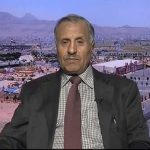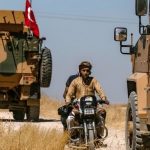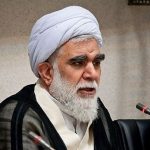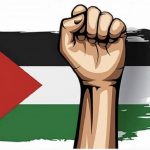Hamza b. ʿAbd al-Muttalib titled as “Asad Allah”, “Asad Rasul Allah” and “Sayyid al-Shuhada” was the Prophet’s (s) uncle and martyred in the Battle of Uhud. Even when Hamza had not still become a Muslim, he defended the Prophet (s) against the harassments of idolaters.
Faraan: He was one of the noble people of Quraysh and therefore when he became Muslim, Quraysh would harass the Prophet (s) less than before. After becoming a Muslim, Hamza was remained among the most important defenders of the Prophet (s). He accompanied Muslims in the Shi’b Abi Talib. Hamza participated in a number of battles including the Battle of Badr and the Battle of Uhud in which he was martyred.
His name meant “lion” or “sharp-sighted”. His teknonym was Abu ‘Umara and Abu Ya’la. His mother was Hala bt. Uhayb (Wuhayb) b. ‘Abd Manaf b. Zuhra. Hamza was titled as “Asad Allah” and “Asad Rasul Allah”. According to a hadith, he was blessed after he was martyred and was titled as “Sayyid al-Shuhada'”.
There are narrations saying that Thu’wayba, Abu Lahab’s female servant breastfed the Prophet (s) and Hamza and that Hamza was the Rida’i brother of the Prophet (s) since he was given milk by the same woman as of the Prophet (s). Hamza was at least two years older than the Prophet (s). Some have even considered this difference about four years which can be even more since some researchers have doubted that Thu’wayba fed the Prophet (s). In any case, he must have been born two to four years before the Year of the Elephant (the year the Prophet (s) was born).
Hamza’s children were three sons with the names of ‘Amara, Ya’la and ‘Amir. ‘Amara (eldest son of Hamza) was present in conquering Iraq. Ya’la had five sons. Although, it is mentioned in sources that Hamza’s progeny did not continue but in 10th/16th century, some people were considered his descendants. Hamza participated in the battles of Fijar and the covenant of Hilf al-Fudul. He attended the ceremony for the Prophet’s (s) proposal to Khadija (a) together with other uncles of the Prophet (s). Even some sources have mentioned his name alone in that ceremony when Abu Talib recited the marriage formula even though he was a little older than the Prophet (s).
In the year when Quraysh suffered a severe famine, the Prophet (s) suggested that someone accepts the guardianship of Abu Talib’s family members since he had a large family; Hamza accepted the guardianship of Ja’far. Al-Tabari mentions Abbas b. ‘Abd al-Muttalib as the person who did so. Hamza was a hunter. Before Islam, he was among the sons of ‘Abd al-Muttalib who became a chief of Quraysh and had such a position that other tribes signed contracts with him.
The day when the Prophet (s) invited his relatives to call them to Islam (Yawm al-Indhar), Hamza also was there. Even before becoming a Muslim, Hamza the same as Abu Talib defended the Prophet (s) against harassments of idolaters. According to some historical narrations report that Hamza retaliated Abu Lahab’s insults to the Prophet (s).
One day, Abu Jahl met the Prophet (s) near the mount Safa and insulted him. The Prophet (s) did not say anything to him. A woman slave was near there and saw what happened. When Hamza came back to Mecca from hunting, he used to circumambulate the Ka’ba then he would go to Quraysh gatherings. Quraysh loved Hamza because of his magnanimity. This time, when he came to Quraysh gathering, that woman slave went to Hamza and told him, “you were not here to see what Abu Jahl said to your nephew!” Hamza went to Abu Jahl and found him sitting among people in Masjid al-Haram.
He stroke his bow on Abu Jahl so hard that his head was badly broke. Then told him, “you dare insult Muhammad?!! You do not know I have accepted his religion?! I say whatever he says!” Banu Makhzum wanted to go help Abu Jahl, but he told them, “Leave Hamza, because I have badly insulted his nephew.” This happening was when Hamza declared his acceptance of Islam. Afterwards, Quraysh saw that the Prophet (s) has a great support like Hamza who will protect him against their harms and thus they annoyed the Prophet (s) less.
Based on a narration by Imam al-Sajjad (a), what made Hamza accept Islam was his defense of the Prophet (s) in a happening when idolaters threw a camel’s uterus on the head of the Prophet (s). However, some researchers believe that Hamza’s acceptance of Islam has been based on awareness and knowledge. He accepted Islam two or six years after the beginning of the Prophet’s (s) mission before Abu Dhar became Muslim. Hamza’s acceptance of Islam was influential in the tendency of his relatives towards Islam.
There is little information about Hamza after accepting Islam before Hijra. When the Prophet (s) revealed his invitation to Islam, Hamza also began inviting people to Islam. He stayed with the Prophet (s) and did not immigrate to Ethiopia. In the two or three years which idolaters besieged Banu Hashim and Banu Muttalib in the Shi’b Abi Talib, Hamza stayed with them. In the second treaty of ‘Aqaba, twelve years after the Prophet (s) began his mission when some of the people of Medina made a treaty with the Prophet (s), Hamza accompanied ‘Ali (a) in guarding that place against idolaters if they wanted to approach there.
His Martyrdom
The Battle of Uhud happened on Saturday, Shawwal 7, 3/March 23, 625 (or on Shawwal 15/March 31). In that battle, Hamza was martyred by Wahshi b. Harb, the Ethiopian slave of the daughter of Harith b. ‘Amir b. Nawfal or the slave of Jubayr b. Mut’im.
According to a report, Harith’s daughter promised Wahshi to free him if he killed Muhammad (s), Hamza or ‘Ali (a) as a revenge for her father who was killed in the Battle of Badr. According to another report, Jubayr b. Mut’im promised Wahshi freedom if he could take revenge of his uncle Tughayma b. ‘Adi who was killed in the battle of Badr. However, undoubtedly, the motives of Hind, daughter of ‘Utba, wife of Abu Sufyan was greater than that of Jubayr or the daughter of Harith to take revenge for her father, brother and uncle who were killed in the battle of Badr. According to some reports, Hind encouraged Wahshi to that with the promise of giving him money.
Mutilation of His Body
According to a report, Hind had a vow to eat the liver of Hamza. First, Wahshi promised to kill ‘Ali (a), but in the battlefield, he martyred Hamza and took his liver to Hind. Hind gave Wahshi her clothes and jewels and promised to give him ten Dinars in Mecca. Then, she came to the body of Hamza and mutilated his body and by those parts of his body she cut, later made earrings, bracelet and anklets for herself. It is said that Mu’awiya b. Mughira and Abu Sufyan also mutilated or injured the body of Hamza.
Due to the savagery of the things happened to the body of Hamza, some companions of the Prophet (s) swore that they would mutilate 30 or more of the people of Quraysh, but the verse 126 of Qur’an 16 was revealed and although it gave them the permission for doing the same but regarded patience a better act instead.
His Burial
Hamza was the first martyr of the Battle of Uhud that the Prophet (s) performed Funeral Prayer upon and then other martyrs were brought in different times and were laid beside him and then the Prophet (s) performed prayer upon them. Therefore, he (s) did prayer upon the martyrs individually or collectively about 70 times. Hamza was shrouded in a piece of cloth, his sister Safiyya had brought, since idolaters had stolen all his clothes.
Crying over Hamza
When the Prophet (s) saw Hamza that way, he cried and when he (s) heard the Helpers crying for their martyrs, he (s) said, “But Hamza does not have anyone to mourn for him!” Sa’d b. Mu’adh heard this and took women to the house of the Prophet (s) and they mourned for Hamza. Since then, any woman from the Helpers who wanted to mourn for a deceased person, would first mourn for Hamza. It is said that Zaynab, daughter of Abu Salama wore black clothes of mourning for Hamza.










